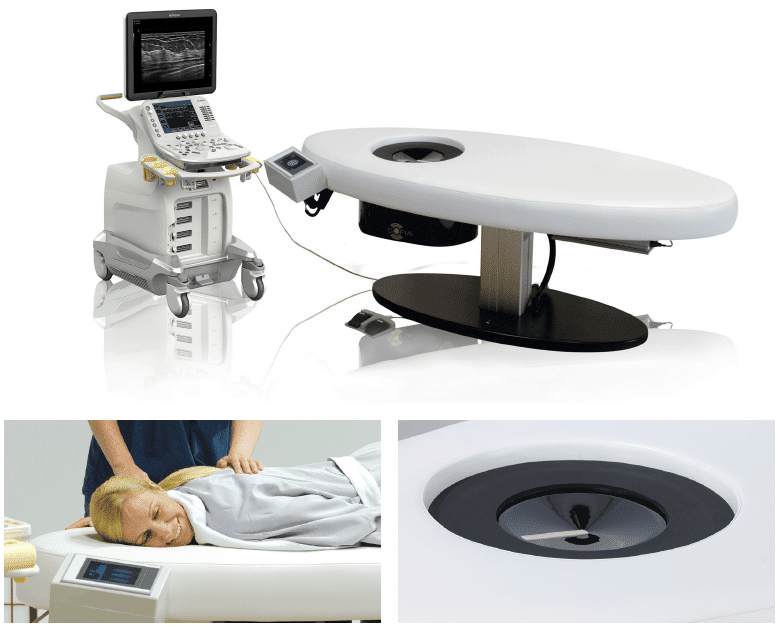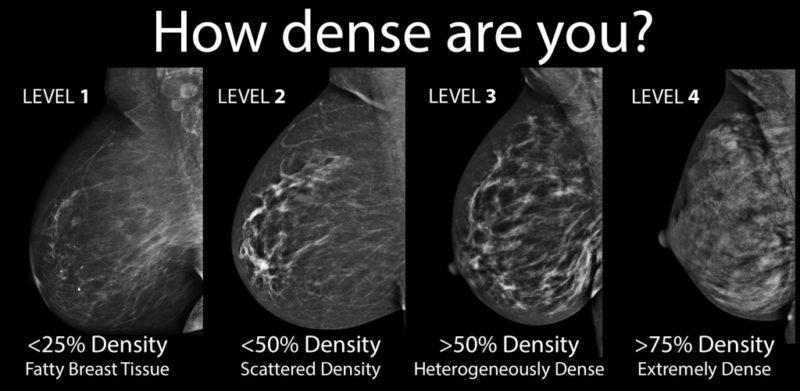Becoming familiar with your breasts and surrounding tissue is important in monitoring for changes or indications of breast cancer signs or symptoms. You may have heard your practitioner refer to the density of your breasts in passing or at a routine examination. This is because breast density is a very important factor in the management of your overall breast health and screening options available to you. It is vital that you are aware of your breast density. In many cases, your breast density is measured during routine breast cancer screenings. If you are found to have dense breast tissue, you must take special care in regard to routine breast cancer screenings.
What are Dense Breasts?
Breast density can vary widely amongst women. The density of your breasts is most commonly measured through a mammogram which will indicate the level of density present throughout your breasts. All breasts are composed of fatty, glandular, and fibrous tissue. How these tissues present themselves within your breast will determine the level of density present.
Women are categorized as having either fatty or dense breast tissue. All breasts have both dense and fatty tissue but each woman will have a different breast composition. Dense breasts are considered breasts that are dense throughout or show extreme density. If you have dense breasts, that indicates a higher presence of fibrous and glandular tissue compared to the level of fatty tissue within your breasts. Breasts with little density are mostly comprised of fatty tissue within the breast.
How Do You Know if You Have Dense Breast Tissue?
Contrary to what some women may think, firm breasts do not necessarily indicate that you have dense breasts and vice versa; a woman with soft breasts cannot be ruled out from having dense breast tissue. The only way to accurately and reliably determine the level of density of your breast tissue is through various screening options such as a mammogram, ultrasound, or MRI.

How Common are Dense Breasts?
It is estimated that approximately 45% of women are categorized as having dense breasts. The reality is that dense breasts are quite common in women. It is also important to note that breast density can change throughout a woman’s life due to a number of factors. In general, women that are younger, pregnant, or breastfeeding are more susceptible to having dense breast tissue. Lower body weight and treatment with hormone replacement therapies can also contribute to having dense breasts. As women age, it is common for their breasts to lose some density but this is not always the case especially in women with extremely dense breast tissue.
Factors Contributing to Breast Density Changes Include:
- Age
- Pregnancy
- Hormone Therapies
- Weight/Body Mass Index
What Does it Mean If You Have Dense Breasts?
Knowing your breast density is just the first step in understanding how this affects your breast health and care. Dense breasts can present a number of challenges and increased risks for women with the condition. Being aware of your breast density can help you plan and prepare to take the right steps in keeping yourself as healthy and informed as possible.
Risks Associated With Dense Breasts
Problematic Imaging & Screening
One of the biggest concerns surrounding dense breast tissue is the difficulty it can present during breast cancer screenings such as a mammogram. Unlike fatty tissue that appears dark on imaging used for breast cancer screening; dense breast tissue appears white. This lack of contrast makes it difficult for radiologists to pinpoint or differentiate areas of concern such as tumors that also appear white on imaging. Unfortunately, this can mask smaller tumors within the breast which can lead to delayed detection of breast cancer in women with dense breasts.
Difficulty with Self-Breast Checks
Getting to know your breasts and being able to recognize changes in your breasts in their appearance or feel is an important tool in the detection of breast cancer. When you have dense breasts your breasts may feel more lumpy or fibrous than a woman with fattier breast tissue. This does not mean you should not perform self-checks of your breasts but rather means you should take extra time and effort in getting to know your breasts throughout the month to be able to identify noticeable changes that may require additional screening or testing.
Increased Risk of Breast Cancer
Although the underlying reason is not always clear, having dense breasts is a risk factor for being diagnosed with breast cancer. In a study conducted by Harvard, it was found that women with 50% or higher breast density were three times more likely to be diagnosed with breast cancer compared with women with little breast density.
Although having dense breasts does not mean you will get breast cancer it does increase your chances and must be considered when managing your breast health along with other breast cancer risk factors or categories that you may have.
Managing Dense Breasts with Routine Breast Cancer Screening
If you have been told you have dense breasts keeping up with your routine breast cancer screenings is critical to managing your care and for early detection. While mammograms can be at times be raise concerns for women with dense breast tissue they are still often necessary as part of your breast cancer screenings. In addition to mammography, there are also additional options available for women with dense breasts and other risk factors to assist in the screening process for breast cancers.
3D mammograms and 3D whole and targeted breast ultrasounds can work together to evaluate women with dense breast tissues. Talk to your doctor about the best screening options for you and the frequency of your routine breast cancer screening. Just as important as the method of breast cancer screening is also the individual reading the imaging results of your diagnostic test. It has been found that breast imaging specialists often have higher success rates of detecting early-stage breast cancer when compared to radiologists who do not specialize in reading breast imaging.
Contact us at Women’s Imaging Specialists to schedule your next breast cancer screening appointment.


